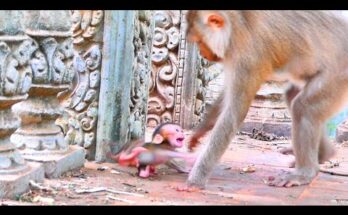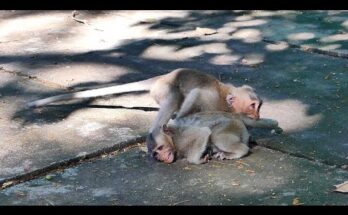In the wild, survival is often a matter of choices, and sometimes those choices reveal surprising priorities. One striking moment was observed when a mother monkey carried both her baby and a ripe mango. What stood out was how she seemed to value the mango more than her little one, focusing her attention on the fruit rather than on the fragile infant clinging to her body.
The mango, golden and sweet, is a valuable source of energy for monkeys. It provides sugar, vitamins, and hydration, all of which are essential for survival in the forest. For the mother monkey, finding such a prize may have felt like securing a treasure, one that could restore her strength and even provide milk for her baby later. But in that moment, her eagerness to enjoy the fruit seemed stronger than her maternal instinct to protect and comfort her young.
As she sat on a branch, she clutched the mango tightly, nibbling at its juicy flesh. The baby, still small and dependent, reached for her attention, but the mother adjusted her grip only enough to keep it from falling while continuing to eat. At times, it looked as though the mango occupied both her hands and her focus, while the baby remained secondary.
This scene, though unsettling, reveals the constant tension in nature between self-preservation and parental care. A mother must stay nourished to produce milk and survive, yet the baby’s need for closeness often competes with that goal. While it seemed the mango was “more important” in that moment, it was perhaps also a way for the mother to ensure her own strength—so she could continue raising her baby tomorrow.
The moment reminds us that motherhood in the wild is complicated, often balancing love with survival.

